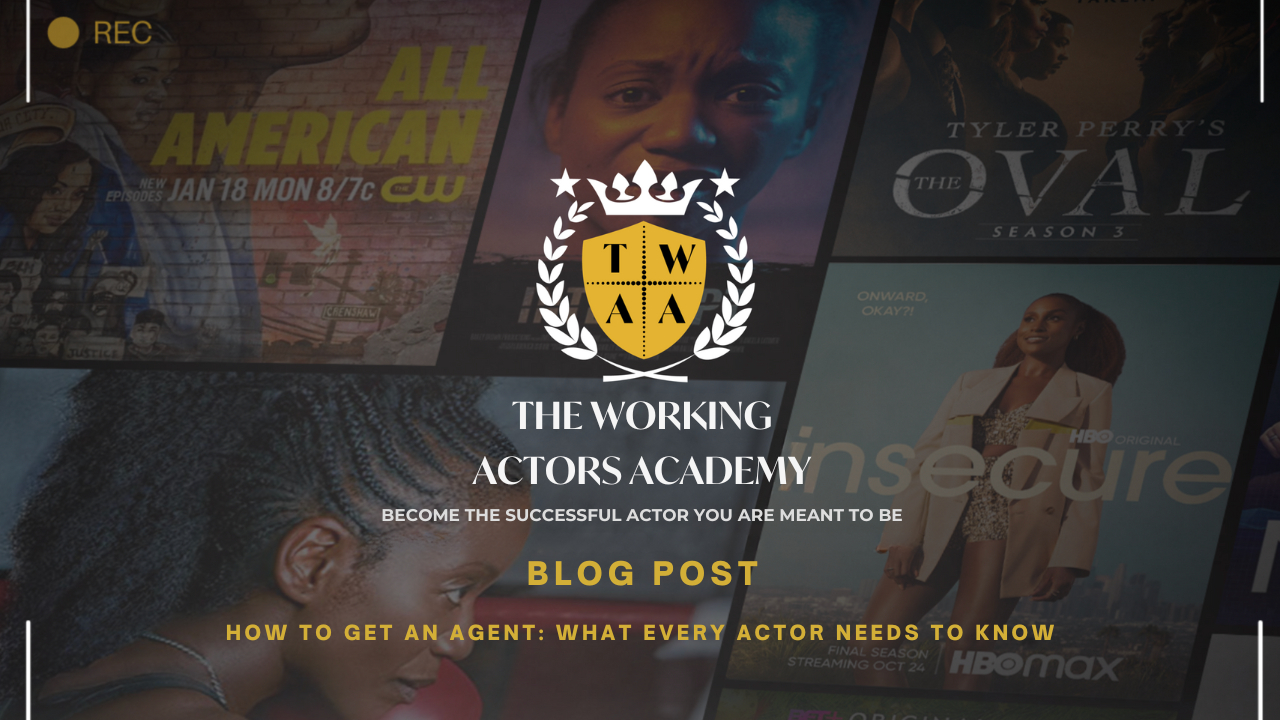How to Get an Agent: What Every Actor Needs to Know
Apr 01, 2025
An agent can open doors to bigger auditions, casting calls, and career opportunities. But how do you get one—especially as a new actor?
Landing the right acting agent can be a game-changer for your career. Agents have access to exclusive casting calls, major projects, and insider opportunities that most actors can’t reach on their own. But here’s the big question: How do you actually get an agent—especially if you’re just starting out?
Whether you’re a new actor or you’ve been grinding for a while, this guide will walk you through the exact steps to find, approach, and sign with the right agent who can help take your career to the next level. 💥
🎭 Why Having an Acting Agent Matters
Let’s be real—having the right agent opens doors.
Here’s what a strong agent can do for your career:
✅ Get You Access to Bigger Auditions: Many major casting calls only go through agents.
✅ Negotiate Contracts & Pay Rates: Agents know how to get you the best deals.
✅ Connect You with Industry Insiders: Agents have relationships with casting directors, producers, and networks.
✅ Guide Your Career Path: A good agent doesn’t just get you auditions—they help shape your career.
💡 Pro Tip: The right agent works with you. It’s a partnership.
💥 Step 1: Build a Strong Actor’s Portfolio
Before approaching any agent, you need a solid package that shows you’re serious about your craft. Think of it like applying for your dream job—you need to look the part.
✅ What You Need:
- Professional Headshots: Clear, high-quality photos that reflect your natural look and type.
- Acting Resume: Even if you have little experience, list your training, workshops, and any roles you’ve done (theater, student films, indie projects, etc.).
- Demo Reel: A short, 1-2 minute video showing your range. If you don’t have footage yet, record self-tapes of contrasting monologues.
- Cover Letter or Intro Email: A brief, professional message introducing yourself and why you’re seeking representation. *(Templates inside TWAA!)
🎬 Need help perfecting your portfolio? Inside The Working Actors Academy, we break it all down step-by-step!
💥 Step 2: Start with Self-Submissions
If you’re brand new, you probably don’t have agents knocking on your door—yet.
The best way to start getting noticed? Self-submit to casting calls on reputable platforms:
🎭 Top Casting Websites for Self-Submissions:
- Actors Access – A go-to for TV, film, and theater roles.
- Backstage – Great for beginners, indie films, and commercials.
- Casting Networks – Used for commercials, voice-over, and print.
- Playbill – Ideal for theater and Broadway auditions.
The more experience and credits you can rack up, the more attractive you’ll be to agents.
💡 Pro Tip: Keep track of the projects you book—even student films and indie gigs can boost your resume.
💥 Step 3: Research & Target the Right Agents
Not all agents are the right fit for you. Some specialize in theater, others in film/TV. Some prefer experienced actors, others focus on fresh talent.
🎯 Here’s how to find the perfect match:
- Use Agency Directories: Check platforms like Casting Networks or IMDB Pro to find agents who represent actors with similar profiles.
- Check Their Roster: Do they already represent someone like you? If so, they might not want competition—but if they have a gap in their roster, that’s an opportunity.
- Read Reviews & Do Your Homework: Check online forums and social media for actor reviews and agency reputations.
💥 Step 4: Send Professional Query Emails
Once you’ve found agents that align with your goals, it’s time to reach out. Your email is your first impression—make it count.
📧 What to Include in Your Query Email:
✅ A clear subject line: “Emerging Actor Seeking Representation – [Your Name]” or Get Creative!
✅ A short, friendly introduction
✅ Your headshot, resume, and demo reel links
✅ A sentence about why you’re interested in their agency
✅ Your contact information
💡 Pro Tip: Be respectful of their time. Keep your email short, clear, and concise.
👋 Need help crafting the perfect email? We’ve got plug-and-play templates inside TWAA.
💥 Step 5: Prepare for the Agent Meeting
If your query piqued their interest, they might request a meeting or audition. This is your chance to shine—but also to see if the agent is a good fit for YOU.
🎬 Questions to Ask During the Meeting:
- “How do you see me fitting into the industry?”
- “What types of roles do you usually submit clients for?”
- “What’s your communication style?”
- “What are your expectations for clients?”
💡 Pro Tip: You’re interviewing them too. You want someone who believes in you—not just someone who sees you as another number. Note: You also need to be able to answer the same questions for yourself.
💥 Step 6: Be Patient & Stay Consistent
Getting an agent doesn’t always happen fast. Sometimes it takes weeks or even months.
Here’s how to stay proactive during the process:
✔ Keep self-submitting to build your resume
✔ Continue training—agents love seeing growth
✔ Network with other actors, directors, and casting agents
✔ Follow up politely if you haven’t heard back after 2 weeks
🎭 And remember—every “no” gets you closer to your “YES.”
💥 Red Flags to Watch Out For:
🚩 Upfront Fees: Legit agents earn a commission from your bookings—not from charging you just to sign.
🚩 Vague or Shady Contracts: Always read the fine print and consider getting legal advice if needed.
🚩 No Real Industry Ties: If they can’t name casting directors they work with or mention legit projects, it’s a red flag.
💡 Pro Tip: The best agents don’t make promises—they offer opportunities.
🚀 Final Thoughts: Your Dream Agent is Out There—Go Find Them!
The right agent can absolutely elevate your acting career, but finding one takes patience, strategy, and persistence.
🎬 If you’re serious about landing an agent, growing your career, and getting BOOKED—
💥 Join The Working Actors Academy and let’s make it happen.
Inside TWAA, you’ll get:
✅ Step-by-step guidance on landing an agent
✅ Templates for emails, resumes, and demo reels
✅ Insider tips from working actors & casting directors
The industry isn’t waiting. Neither should you. 💫

